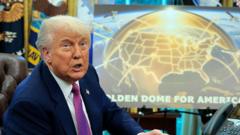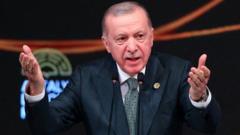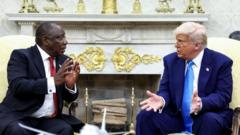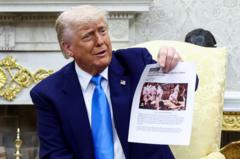### Description:
### Title:

### Title:
Ramaphosa's Cold Encounter with Trump: A Potential Political Boon
Despite a tense meeting with Donald Trump, South African President Cyril Ramaphosa may find unexpected support back home, as he exemplifies diplomatic resilience in the face of adversity.
### Summary:
While President Ramaphosa faced a confrontational meeting with Trump, his composed demeanor may strengthen his position domestically amid pressing political and economic challenges. Ramaphosa's diplomatic skills stand out as he addresses criticism and seeks trade partnerships, potentially reinforcing the stability of his government.
Cyril Ramaphosa, South Africa’s President, encountered a challenging diplomatic moment in Washington this week, facing President Donald Trump’s provocative claims of white genocide in South Africa. Ramaphosa arrived aiming for a reset in US-South African relations after months of diplomatic tensions, yet the meeting turned into a high-profile confrontation broadcast to millions.
Despite the turbulence, many South Africans praised Ramaphosa for his composed, diplomatic response. However, calls for a more assertive reaction to Trump’s accusations revealed a divide in expectations back home. The ANC government, facing poor coalition dynamics and mounting social issues, is under intense scrutiny, making Ramaphosa’s encounter with Trump a focal point of political discourse.
Domestic pressures abound, with South Africa grappling with a stagnant economy, rampant crime, and high unemployment, issues that Ramaphosa aims to address through potential trade agreements with the US. The urgency surrounding the African Growth and Opportunity Act (AGOA) trade deal, set to expire soon, highlighted Ramaphosa’s need for foreign investment to combat domestic challenges.
While the Oval Office meeting may have seemed to place Ramaphosa in a compromised position, analysts suggest it could yield a silver lining for his leadership. The experience serves to remind the nation of Ramaphosa's diplomatic legacy, particularly his historical role in negotiating an end to apartheid and maintaining South African unity during turbulent times.
Political commentators like Verashni Pillay underscore the importance of Ramaphosa’s calming presence and his ability to navigate high-pressure situations. The notion of the “Ramaphosa Effect” denotes his potential to maintain the ANC party's support despite significant issues. His historical abilities to foster alliances resonate with citizens, providing some reassurance amid political fragmentation.
Furthermore, the presence of key figures during the meeting, such as John Steenhuisen from the Democratic Alliance and businessman Johann Rupert, underscored a coalition that crosses racial divides. This public display of unity may bolster Ramaphosa’s position domestically, even as challenges remain unaddressed.
As Ramaphosa returns home, the political landscape reflects mixed sentiments towards both Trump's criticisms and his own leadership. While some may perceive Trump's antics as diminishing, others, including critics like Julius Malema, might leverage these events for their political gain. However, analysts believe Malema's rhetoric may not resonate with a broader demographic desiring stability over chaos.
In the wake of this divisive moment, it remains to be seen how Ramaphosa will maneuver South Africa through its current struggles. Following the Oval Office drama, the President finds himself at another potential turning point in his leadership journey—one with the power to reshape his government's standing in the public eye.
### Summary:
While President Ramaphosa faced a confrontational meeting with Trump, his composed demeanor may strengthen his position domestically amid pressing political and economic challenges. Ramaphosa's diplomatic skills stand out as he addresses criticism and seeks trade partnerships, potentially reinforcing the stability of his government.
Cyril Ramaphosa, South Africa’s President, encountered a challenging diplomatic moment in Washington this week, facing President Donald Trump’s provocative claims of white genocide in South Africa. Ramaphosa arrived aiming for a reset in US-South African relations after months of diplomatic tensions, yet the meeting turned into a high-profile confrontation broadcast to millions.
Despite the turbulence, many South Africans praised Ramaphosa for his composed, diplomatic response. However, calls for a more assertive reaction to Trump’s accusations revealed a divide in expectations back home. The ANC government, facing poor coalition dynamics and mounting social issues, is under intense scrutiny, making Ramaphosa’s encounter with Trump a focal point of political discourse.
Domestic pressures abound, with South Africa grappling with a stagnant economy, rampant crime, and high unemployment, issues that Ramaphosa aims to address through potential trade agreements with the US. The urgency surrounding the African Growth and Opportunity Act (AGOA) trade deal, set to expire soon, highlighted Ramaphosa’s need for foreign investment to combat domestic challenges.
While the Oval Office meeting may have seemed to place Ramaphosa in a compromised position, analysts suggest it could yield a silver lining for his leadership. The experience serves to remind the nation of Ramaphosa's diplomatic legacy, particularly his historical role in negotiating an end to apartheid and maintaining South African unity during turbulent times.
Political commentators like Verashni Pillay underscore the importance of Ramaphosa’s calming presence and his ability to navigate high-pressure situations. The notion of the “Ramaphosa Effect” denotes his potential to maintain the ANC party's support despite significant issues. His historical abilities to foster alliances resonate with citizens, providing some reassurance amid political fragmentation.
Furthermore, the presence of key figures during the meeting, such as John Steenhuisen from the Democratic Alliance and businessman Johann Rupert, underscored a coalition that crosses racial divides. This public display of unity may bolster Ramaphosa’s position domestically, even as challenges remain unaddressed.
As Ramaphosa returns home, the political landscape reflects mixed sentiments towards both Trump's criticisms and his own leadership. While some may perceive Trump's antics as diminishing, others, including critics like Julius Malema, might leverage these events for their political gain. However, analysts believe Malema's rhetoric may not resonate with a broader demographic desiring stability over chaos.
In the wake of this divisive moment, it remains to be seen how Ramaphosa will maneuver South Africa through its current struggles. Following the Oval Office drama, the President finds himself at another potential turning point in his leadership journey—one with the power to reshape his government's standing in the public eye.



















